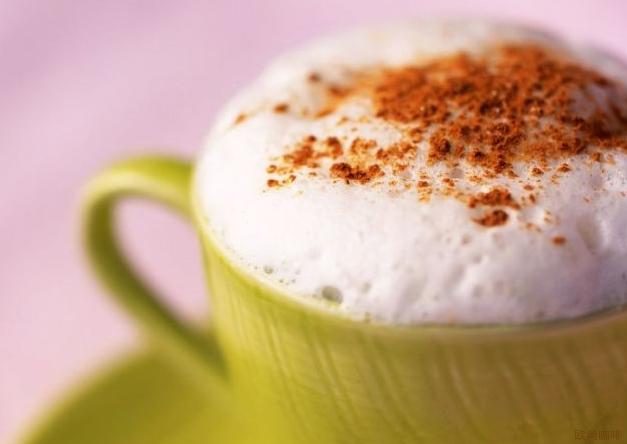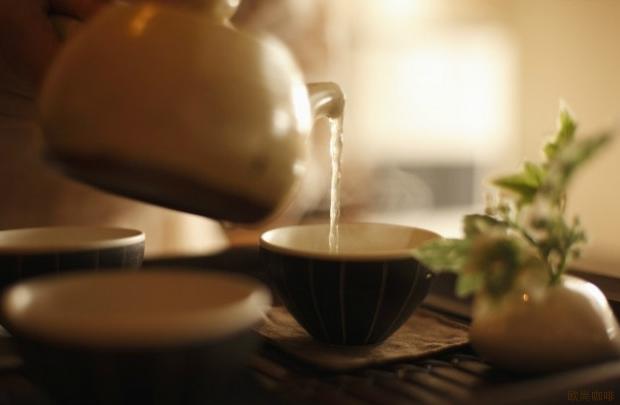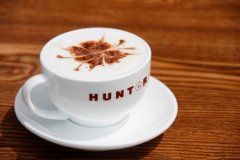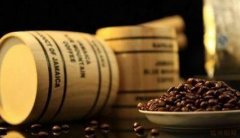The ancients drank tea and played "pull flowers", which far exceeded the modern coffee skills.
Cappuccino, popular in the 21st century, pays special attention to pulling flowers, to pull into a variety of patterns, heart-shaped, rose-shaped, or pull out two connected hearts, or pull out the five petals of plum blossoms, in a variety of ways, to name a few. In fact, people in the Tang and Song dynasties played the game of pulling flowers more than a thousand years ago, and their skills are far better than those in these modern cafes.

The tea ceremony in the Tang and Song dynasties played the flower game as an elegant game, and everyone was infatuated with it from the general public to the royal family. In the Tang and Song dynasties, the mainstream way of drinking tea was to fry it at the end of the study. In the Tang Dynasty, the tea was first made into a tea ball, then cooked before it was cooked, and then poured into a soup pot to form foam; in the Song Dynasty, the tea powder at the end of the study was changed into a paste, and then poured into the soup and brushed with oysters to make foam. The key is that the way of drinking tea is different from that of modern times, which is to make foam and sip white foam.
In the "five boils" of Lu Yu's Tea Classic, the tea leaves after cooking and research are described in detail and put into a tea bowl to create a sense of visual beauty: "every drink is placed in a bowl to make the cake even." Mo Bian, Tang Zhihua is also. The thin man is called foam, and the thick one is called cake. Those who are thin and light are called flowers, such as jujube flowers floating above the ring pool, like the birth of green duckweed in Huitan Quzhu, and like floating clouds on a sunny day. Its foam, if the green money floats in the water, but also like the chrysanthemum British fall in the maze. For those who are popular, if they boil it with me, it will be heavy and lavish, but if it is covered with snow, there is the so-called 'coruscate like snow, Ye if spring compress'. " This passage is translated into vernacular as follows:
When drinking, pour the tea into the bowl to make the cake evenly. Foam cake is the essence of tea soup. The essence is thin, it is called foam; the essence is thick, it is called cake. Gently call it a flower, like a jujube flower floating on a round pond; like a zigzag pool of water giving birth to green duckweed; and like a bright sunny day dotted with scaly clouds. The foam of the tea is like green duckweed floating on the edge of the water, and like chrysanthemums falling into the cup. The cake of the tea soup is boiled with tea dross, and after boiling, it accumulates layers of white foam, which is as thick as snow. There is the so-called "bright as snow and gorgeous as spring flowers" in "Fu Fu".

Jiao ran, a poet monk in the Tang Dynasty, a good friend of Lu Yu, wrote many poems about tea, which talked about the process of cooking tea and described the foam that would appear at the end of cooking tea. For example, in the poem "drinking Tea Song to Zheng Rong", there is a saying, "Frost folds the grass in the middle of the night, and the flowers are in full bloom." fragrant grass refers to tea, which is crushed and ground into tea powder, and a light yellow foam will appear when it is cooked and fried. In another poem, "Lu Xun drinks Tianmu Camellia because of Yuan Jusheng", there is a saying, "throw the bell into foam and gather flowers in the bowl". It is about pouring the ground tea powder into the tea bell, rolling out the foam in the boiling water, and pouring it into the bowl to form flowers.
In the Northern Song Dynasty of the five dynasties, the Qing Yi Lu of Tao Meng (903-970) had a chapter called "Mingfu", which recorded the tea events at that time. Although some people say that this book may have been written by others under the fake support of Tao Hun, it is no problem that the book was written in the Song Dynasty, and the things recorded are reliable from the five dynasties to the early Song Dynasty. There is a rule in the book: "those who eat tea and make things look like noodles in soup, the tea craftsman knows the art of God." Shamen Fu Quan was born in Jinxiang and grew up in the sea of tea. he can inject soup and magic tea into a poem. And point Siou, a total of a unique sentence, all over the soup table. Small things are easy to do. Tan Yue built the door to see the Tang Opera, and all chanted from himself: 'the picture of the water in the calyx is generated, and you can't learn to draw skillfully. But laughed at Lu Hung-chien at that time, fried tea to win a good reputation.'" It is about a Fuquan monk at that time who was so skillful in brewing tea that he was able to pull flowers in the tea bowl and pull out a poem when injecting soup. The best skill is to be able to put four tea bowls at the same time and pull out a last sentence.
The Chinese ancients played with flowers, but it was more than that. "Qing Yilu" said, "Tea to Tang Shisheng. In recent times, there is soup luck, don't use tricks to make soup veins into objects, animals, insects, fish, flowers and plants, delicate and picturesque. But it dissipated in a moment. The change of this tea is also called 'tea opera' at that time.
Interestingly, at that time, many monks were masters of ordering tea and pulling flowers. For example, there was a monk in the south of the Yangtze River, and he was nicknamed "Tang God". It can be seen that his skill is excellent. Perhaps it is because monks have no earthly chores to interfere with except meditating and reciting sutras, so they have a lot of time to concentrate on ordering tea.
Important Notice :
前街咖啡 FrontStreet Coffee has moved to new addredd:
FrontStreet Coffee Address: 315,Donghua East Road,GuangZhou
Tel:020 38364473
- Prev

The origin of coffee, the method of making and blending coffee, and pay attention to the details.
Coffee is the transliteration of English Coffee. It is a drink made from roasted coffee beans, ground into powder and then brewed. (1) A brief introduction to Coffee 1. The origin of coffee Coffee originated in Ethiopia in Africa. There are many theories about discovering it, among which a legend accepted by most people is that about 3000 years ago, a shepherd saw the sheep he was herding ate a kind of nameless food.
- Next

Gourmet coffee also needs to be able to "brew"! Learn the method of brewing Blue Mountain Coffee
Blue Mountain Coffee has a strong flavor and a long-lasting fruity flavor. Pure Jamaican Blue Mountain Coffee perfectly combines the unique sour, bitter, sweet, mellow and other flavors of coffee to form a strong and attractive elegant flavor, which is unmatched by other coffee. People who love Blue Mountain Coffee say: it is a coffee beauty that combines all the advantages of good coffee. How to make Blue Mountain Coffee? Blue Mountain Coffee is coffee.
Related
- Detailed explanation of Jadeite planting Land in Panamanian Jadeite Manor introduction to the grading system of Jadeite competitive bidding, Red bid, Green bid and Rose Summer
- Story of Coffee planting in Brenka region of Costa Rica Stonehenge Manor anaerobic heavy honey treatment of flavor mouth
- What's on the barrel of Blue Mountain Coffee beans?
- Can American coffee also pull flowers? How to use hot American style to pull out a good-looking pattern?
- Can you make a cold extract with coffee beans? What is the right proportion for cold-extracted coffee formula?
- Indonesian PWN Gold Mandrine Coffee Origin Features Flavor How to Chong? Mandolin coffee is American.
- A brief introduction to the flavor characteristics of Brazilian yellow bourbon coffee beans
- What is the effect of different water quality on the flavor of cold-extracted coffee? What kind of water is best for brewing coffee?
- Why do you think of Rose Summer whenever you mention Panamanian coffee?
- Introduction to the characteristics of authentic blue mountain coffee bean producing areas? What is the CIB Coffee Authority in Jamaica?

